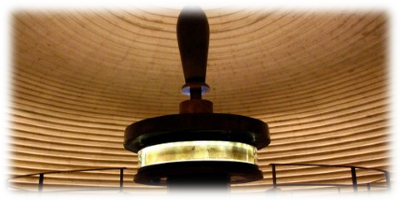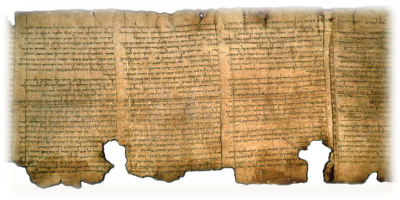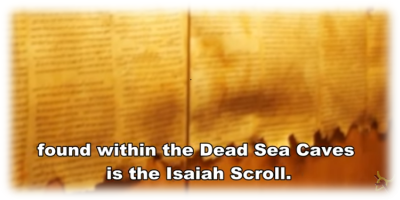The Isaiah Scroll and the Aleppo Codex
Comparing Isaiah 53:11
Interlinear of Isaiah 53
Selections from the Isaiah Scroll
The Isaiah Scroll and the Aleppo Codex
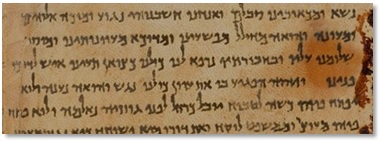
A section of the Isaiah Scroll
The most famous of the Dead Sea Scrolls found within the Dead Sea Caves is the "Great Isaiah Scroll."
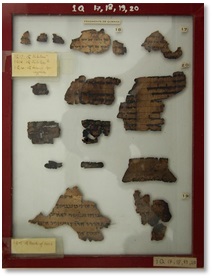
Dead Sea Scroll fragments on display
(Photograph courtesy of Berthold Werner)
While most of the scrolls are fragmented, deteriorating or incomplete, the Isaiah scroll is the only complete scroll found within the Dead Sea caves.
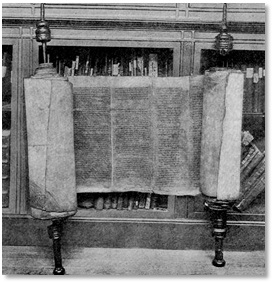
A Torah Scroll
The life of a scroll depends on its handling and storage, but can be in use by a community for several hundred years. Some Torah Scrolls, still in use in synagogues today, are over 500 years old.
The Isaiah scroll from the Dead Sea Caves has been dated to around 200 B.C. Isaiah wrote his original scroll around 700 B.C. and may have been in use up until around 200 B.C. This means that it is possible for the Isaiah Scroll from the Dead Sea Caves to be a copy made directly from Isaiah's original scroll. The Isaiah scroll, as well as many other scrolls and fragments from the Dead Sea, are currently stored and on display in Jerusalem at the Shrine of the Book.
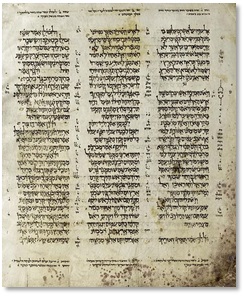
A page from the Aleppo Codex
Up until the discovery of the Dead Sea Scrolls, the oldest existing complete Hebrew Bible was the Aleppo codex, one of the Masoretic texts, which was written in the 10th Century A.D., a thousand years after the Dead Sea Scrolls. For centuries, this text has been the foundation for Jewish and Christian translators.
The major difference between the Aleppo Codex and the Dead Sea Scrolls is the addition of the vowel pointings (called nikkudot in Hebrew) in the Aleppo Codex to the Hebrew words. These pointings provide the vowel sounds that are not present in the Hebrew language and were probably inserted into the text to standardize the pronunciation of the Hebrew words in the text.

The name ישראל (Israel) in a Dead Sea Scroll (left) and the Aleppo Codex (right)
The name ישראל (yis'ra'el – Israel), is spelled in Hebrew with five letters; י (yud-Y), ש (sin-S), ר (resh-R), א (aleph) and ל (lamed-L), and can be transliterated as Y-S-R-L. Only these five letters are used in the Dead Sea Scrolls to spell out the name Y-S-R-L, but in the Aleppo codex, vowel pointings, in the form of dots and dashes are placed above and below each letter to represent the vowel sounds (i, a and e), providing the pronunciation YiSRa'eL.
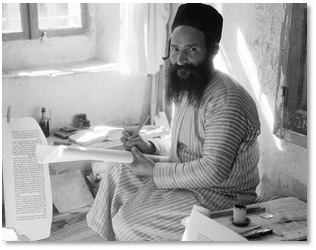
A Jewish Scribe, c. 1935
While the Masoretic text and the Dead Sea Scrolls were transcribed a thousand years apart, they are amazingly similar proving that the copying methods employed by the Jewish scribes over the centuries were very sophisticated and successful. However, there are some differences; some are simple variations of a reading, while others are much more complex.
Besides the addition of the vowel pointings, other changes have occurred in the Hebrew text after making copies of copies. One of the more dramatic changes is the accidental removal of whole verses.

A portion of Psalm 145 from the Aleppo Codex
Psalm 145 is an acrostic psalm where each verse begins with the next letter of the Hebrew alphabet. In the Aleppo Codex the first verse begins with the letter aleph, the second with the beyt, the third with the gimel, and so on. Verse 13 begins with the letter מ (mem-top letter highlighted in red), the 13th letter of the Hebrew alphabet, the next verse begins with the letter ס (samech-bottom letter highlighted in yellow), the 15th letter of the Hebrew alphabet. There is no verse beginning with the 14th letter נ (nun).

A portion of Psalm 145 from the Dead Sea Scrolls
When we examine Psalm 145 from the Dead Sea Scrolls, we find between the verse beginning with the מ (mem-top letter highlighted in red) and the verse beginning with the ס (samech-bottom letter highlighted in yellow), the verse beginning with the letter נ (nun-center letter highlighted in blue). This verse, missing from the Aleppo Codex, reads, נאמן אלוהים בדבריו וחסיד בכול מעשיו (God is faithful in his words, and gracious in all his deeds).
This is why Psalm 145:13 reads differently in the King James Version and the modern versions such as the Revised Standard Version. The King James Version was written prior to the discovery of the Dead Sea Scrolls, but the Revised Standard Version, and other modern versions, were written afterward and often incorporate what has been found in the Dead Sea Scrolls.
Comparing Isaiah 53:11
Of the 166 words in Isaiah 53, there are only 17 letters in question. Ten of these letters are simply a matter of spelling, which does not affect the sense. Four more letters are minor stylistic changes, such as conjunctions. The three remaining letters comprise the word LIGHT, which is added in verse 11 and which does not affect the meaning greatly. Furthermore, this word is supported by the Septuagint (LXX). Thus, in one chapter of 166 words, there is only one word (three letters) in question after a thousand years of transmission - and this word does not significantly change the meaning of the passage. (Norman Geisler & William Nix, A General Introduction to the Bible, Moody Press, Page 263).
I have read the above quote recently and have also heard very similar statements in chat rooms, forums, bulletin boards, web sites and other publications in the past. While I have reviewed several passages of the book of Isaiah to compare the text of the Great Isaiah scroll found in the Dead Sea Caves with the Masoretic text, I decided to put the above quotation to the test. I began with verse 1 of chapter 53 and found that it did not take long to find 17 letters that varied from the Isaiah scroll and the Masoretic text. In just the first 3 verses of chapter 53, a total of 23 words in the Masoretic text and 24 words in the Great Isaiah scroll, I found 19 letters that were different between the two texts. Below is a picture of verses 1 through 3 in the Great Isaiah scroll. Each red dot above a letter represents an additional letter or changed letter in the Isaiah scroll that is not present or is different in the Masoretic text. The number next to each dot represent a corresponding number below the image describing the differences.

- The letter vav in Isaiah scroll not in the Masoretic text. Grammatical difference only.
- The letter vav in Isaiah scroll not in the Masoretic text. Grammatical difference only.
- The letter aleph in Isaiah scroll not in the Masoretic text. Grammatical difference only.
- The letter vav in Isaiah scroll not in the Masoretic text. Grammatical difference only.
- The letter vav in Isaiah scroll not in the Masoretic text. This word would be pronounced as to'ar in the masoretic text, but in the Isaiah scroll it is ta'or.
- The letter vav in Isaiah scroll not in the Masoretic text. Grammatical difference only.
- The letter lamed in Isaiah scroll not in the Masoretic text. A prefix meaning "to".
- The letter vav in Isaiah scroll not in the Masoretic text. A suffix meaning "him".
- The letter vav in Isaiah scroll not in the Masoretic text. Grammatical difference only.
- The letter nun in Isaiah scroll but the letter hey in the Masoretic text. The word venech'medehu in the Masoretic text means "will delight in him" but the word venech'med'nu in the Isaiah scroll means "will delight us".
- The letter vav in Isaiah scroll not in the Masoretic text. This letter is prefixed to mean "and".
- The letter vav in Isaiah scroll not in the Masoretic text. Grammatical difference only.
- The Masoretic text has viydua meaning "and he knew" while the Isaiah scroll has viode meaning "he knows". The two letters have swapped places.
- The letter vav in Isaiah scroll not in the Masoretic text. Grammatical difference only.
- The letter yud in Isaiah scroll not in the Masoretic text. Possibly an unknown word related to the same word found in the Masoretic text.
- The letter vav in Isaiah scroll not in the Masoretic text. A prefix meaning "and".
- The letter vav in Isaiah scroll not in the Masoretic text. A suffix meaning "him". The reading of the Isaiah scroll is venivzehu (and despised him) while the Masoretic text is nivzeh (he was despised).
- The letter vav in Isaiah scroll not in the Masoretic text. Grammatical difference only.
- The letter vav in Isaiah scroll not in the Masoretic text. Grammatical difference only.
Below is the King James Version of Isaiah 53:1-3.
[1] Who hath believed our report? and to whom is the arm of the LORD revealed?
[2] For he shall grow up before him as a tender plant, and as a root out of a dry ground: he hath no form nor comeliness; and when we shall see him, there is no beauty that we should desire him.
[3] He is despised and rejected of men; a man of sorrows, and acquainted with grief: and we hid as it were our faces from him; he was despised, and we esteemed him not.
Below is the same passage from the Great Isaiah Scroll. Differences between the King James Version and the Great Isaiah Scroll are underlined. While these differences are not severe, at least in these few passages, it clearly demonstrates that more than 17 differences exist in Isaiah 53 between the Dead Sea Scrolls and the King James Version.
[1] Who hath believed our report? and to whom is the arm of the LORD revealed?
[2] For he shall grow up before him as a tender plant, and as a root out of a dry ground: he hath no form nor he hath comeliness; and when we shall see him, there is no beauty that we should desire ourselves.
[3] He is despised and rejected of men and man of sorrows, and he knows grief: and we hid as it were our faces from him; and despised him, and we esteemed him not.
Interlinear of Isaiah 53
Below is an interlinear text of Isaiah chapter 53 made by "Malawk" comparing the Isaiah scroll from the Dead Sea Caves (100 B.C.E.) and the Masoretic text (1000 C.E.). The top line is the Hebrew text from the scroll and below it is the Hebrew Masoretic text.

Selections from the Isaiah Scroll
Isaiah 7:14

Image excerpted from Great Isaiah Scroll Directory
This passage from the Dead Sea Scrolls has a few differences from the Masoretic text (as used today in all Hebrew Bibles and which most translations are based on). In the top line the word יהוה (YHWH) is underlined, this is the name of God. In the Masoretic text the word אדוני (adonai) is used instead.
In the bottom line, near the middle is the word וקרא (v'qara) meaning "he will call". In the Masoretic text this word is written as וקראת (v'qarat) meaning "she will call".
On the bottom line near the left end is the word עמנואל (imanuel). This word is the combination of two words - עמנו אל (imanu el). Because these two words are grouped together as one, we know that it is a name. In the Masoretic text this name is written as two separate words - עמנו אל (imanu el).
Isaiah 9:6

Image excerpted from Great Isaiah Scroll Directory
This verse also has a few differences from the Masoretic text. On the bottom line the underlined word to the right is אלגבור (elgibor). In the Masoretic text this is written as two words - אל גבור (el gibor). The word אל (el) means "God" and גבור (gibor) means "warrior". Together these words mean "God is a warrior". Because these two words are written as one in the Dead Sea Scroll it appears that these two words are a name - "elgibor".
The two underlined words to the left of "elgibor" is אבי עד (aviy ad). The word אבי (aviy) means "father of..." and עד (ad) means "again" or "until". This word is often used in the phrase לעלם ועד (l'olam v'ed). While this is usually translated as "forever and ever" it literally means "to eternity and again". The word עד (ad/ed) never means "eternity". These two words would best be translated as "father of Ad (a name)" as "father of again" or "father of until" makes no sense. In the Masoretic text these two words are written as one indicating a name - Aviyad.
The far-left underlined phrase is שר השלום (sar hashalom). In the Masoretic text this phrase is written as שר שלום (sar shalom), the letter ה (ha) meaning "the" is missing. The word שר (sar) means "ruler" and שלום (shalom) means "peace" (or more literally whole or complete). The phrase in the Masoretic text would be translated as "ruler of peace" while in the Dead Sea Scroll it would be "ruler of the peace" or "ruler of the peaceful one". It is likely the word השלום (hashalom) is again a name - Hashalom (Another name for "Jerusalem?").
Realizing that this verse is identifying the name of child, it is likely that the final words of this passage would be translated as "Elgibor the father of Ad, ruler of Hashalom".
Isaiah 53:11

Image excerpted from Great Isaiah Scroll Directory
The underlined phrase reads מעמל נפשוה יראה אור וישבע (mey'amal naphshoh yireh or vayis'ba). In the Masoretic text this phrase is written as מעמל נפשו יראה ישבע (mey'amal naphsho yireh yis'ba). Without even knowing Hebrew one can see that the Dead Sea Scroll includes some information that is not in the Masoretic text. The Masoretic text translates to "from the labor of his soul, he will see, he will be satisfied". The Dead Sea Scroll text translates to "from the labor of his soul, he will see light and he will be satisfied".

Like what you’re discovering? Continue the journey from Bible reader to translator.
|



